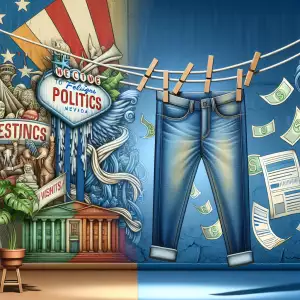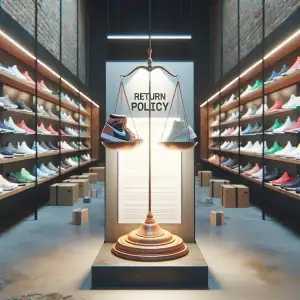Politics Jeans: The Latest Trend in Fashion or Just a Fad?
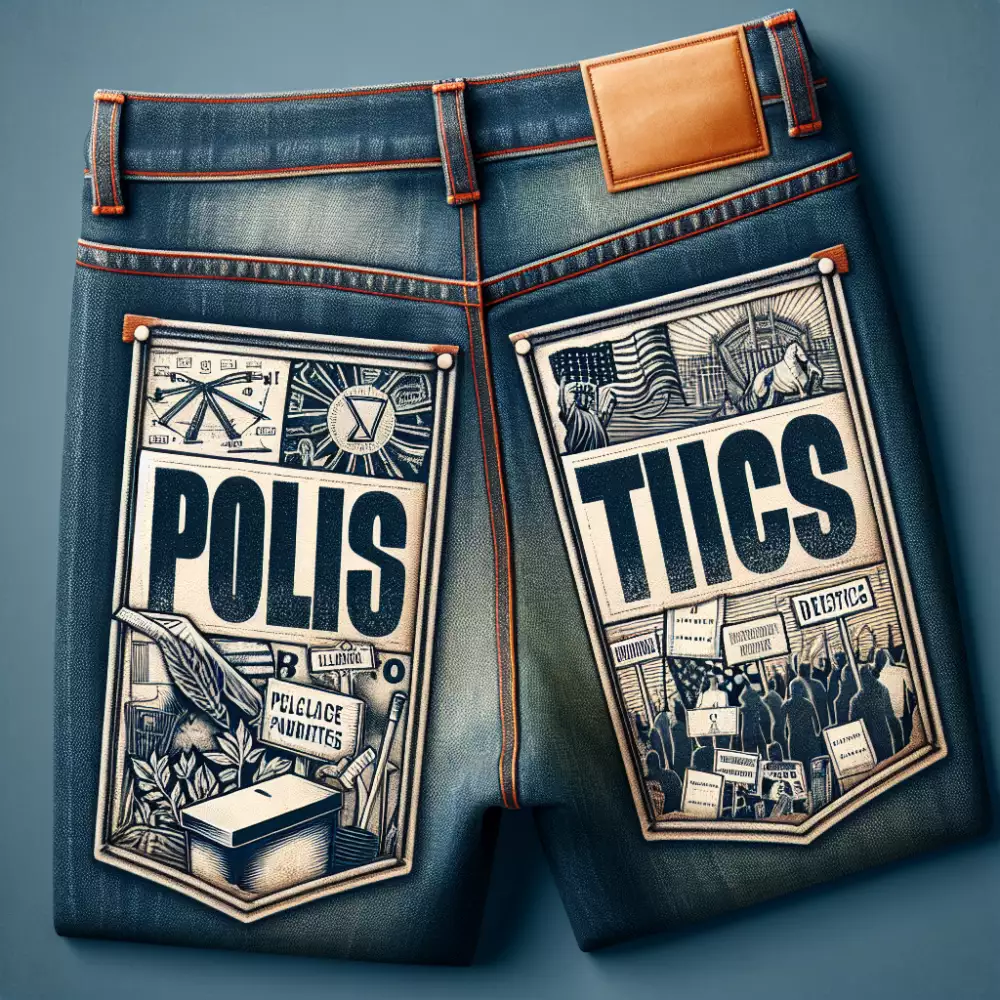
- Politics Jeans: Trend or Brand?
- History of Political Statements in Fashion
- Rise of Slogan Tees and Activist Apparel
- Denim as a Canvas for Expression
- Popular Politics Jeans Brands
- Celebrities and Politicians Rocking the Look
- How to Style Your Politics Jeans
- Finding Affordable and Ethical Options
- The Impact of Fashion Choices
- Future of Politics in Fashion
- Beyond Jeans: Other Political Garments
Politics Jeans: Trend or Brand?
The term "politics jeans" is intriguing. Is it a brand, a trend, or something else entirely? A quick search reveals no major fashion house or brand using "Politics Jeans" as their name. This suggests it's not a specific brand but rather a concept, perhaps even a burgeoning trend.
Think about it: fashion has always been a powerful tool for self-expression, and what better way to express your beliefs than through your clothing? We've seen the rise of slogan tees and politically charged accessories, so why not jeans?
Imagine jeans with embroidered political slogans, patches representing different parties, or even denim jackets adorned with political figures. It's not hard to see how "politics jeans" could become a way for people, especially younger generations, to wear their political affiliations on their sleeves, literally.
However, this potential trend raises questions. Would it be seen as a powerful statement or simply trivialize important issues? Could it lead to more division or encourage dialogue? Only time will tell if "politics jeans" will remain a concept or evolve into a full-blown fashion phenomenon. One thing is certain: the intersection of fashion and politics is a fascinating space to watch.
History of Political Statements in Fashion
Fashion and politics have always been intertwined, and denim, with its working-class roots, has often found itself at the crossroads of this dynamic relationship. While a specific brand named "Politics Jeans" might not be widely documented, the concept itself speaks to a broader historical trend.
Think back to the 1960s counterculture movement, where jeans transformed from workwear to a symbol of rebellion and youth protest. They became a powerful visual statement against the Vietnam War and societal norms. Similarly, the punk movement in the 1970s embraced ripped jeans, safety pins, and provocative slogans as a form of anti-establishment expression.
In more recent times, designers and brands have used jeans as a canvas for political messaging. Slogans, patches, and even the cut and fit of jeans have been employed to advocate for social justice, environmentalism, and other political causes. Even the simple act of choosing sustainable and ethically produced denim can be seen as a political statement in itself, reflecting a commitment to fair labor practices and environmental responsibility.
While the relationship between fashion and politics can be complex and sometimes controversial, there's no denying that clothing, including jeans, has the power to spark conversations, challenge norms, and even inspire change.
Politics Jeans: Where fashion makes a statement, not a promise.
Eamon Dempsey
Rise of Slogan Tees and Activist Apparel
The intersection of fashion and politics has never been more prominent, with clothing evolving into a powerful medium for self-expression and sparking conversations. Slogan tees, once a niche trend, have gone mainstream, allowing individuals to wear their beliefs quite literally on their sleeves. This rise of "activist apparel" transcends mere fashion; it's about aligning oneself with causes, movements, and ideologies. Brands like "Politics Jeans," if it were to exist, would tap into this desire for clothing that makes a statement. Imagine jeans with embroidered quotes from influential figures or denim jackets adorned with patches representing different social justice movements.
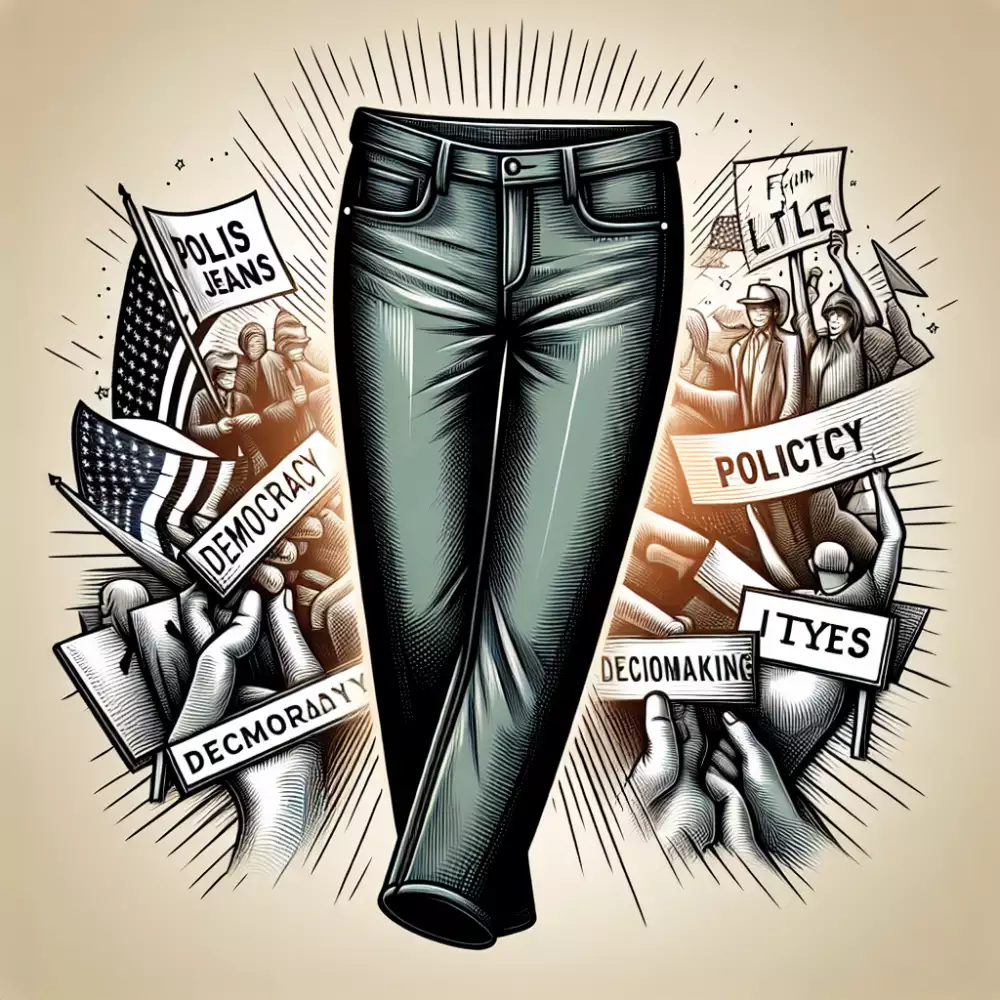
This trend isn't just about making a statement; it's about sparking dialogue. When someone asks, "Where'd you get those jeans?" it opens the door to discuss the quote, the figure, or the movement it represents. It transforms a simple pair of jeans into a conversation starter, a vehicle for education, and a subtle yet powerful call to action. The beauty of this trend lies in its accessibility. You don't need to be a fashion icon or a political expert to participate. All you need is a voice and the willingness to wear it proudly.
Denim as a Canvas for Expression
Denim, a fabric woven into the history of rebellion and counterculture, has always been more than just clothing. It's a blank canvas, a billboard for personal expression, and increasingly, a platform for political statements. From the faded bell bottoms of the anti-war movement to the ripped jeans of punk rock, denim has long been associated with challenging the status quo.
This connection between denim and politics isn't just historical. Today, we see it in the rise of brands like "Politics Jeans" (hypothetical brand for the purpose of this example), which directly incorporate political messaging into their designs. These brands understand that clothing can be a powerful tool for starting conversations and raising awareness about important issues.
Beyond specific brands, the way we wear and personalize our denim can also be political. A simple pin, patch, or even the way we choose to distress our jeans can communicate our values and beliefs. In an age where social media amplifies individual voices, denim offers a tangible, wearable way to engage in political discourse. Whether it's through supporting brands with ethical manufacturing practices or customizing our jeans with symbols of causes we care about, denim allows us to wear our hearts, and our politics, on our sleeves (or rather, our legs).
Popular Politics Jeans Brands
The term "politics jeans" doesn't actually refer to a specific brand. It's more about how jeans reflect political views or become part of political movements. Think about it: jeans have always been a blank canvas for self-expression.
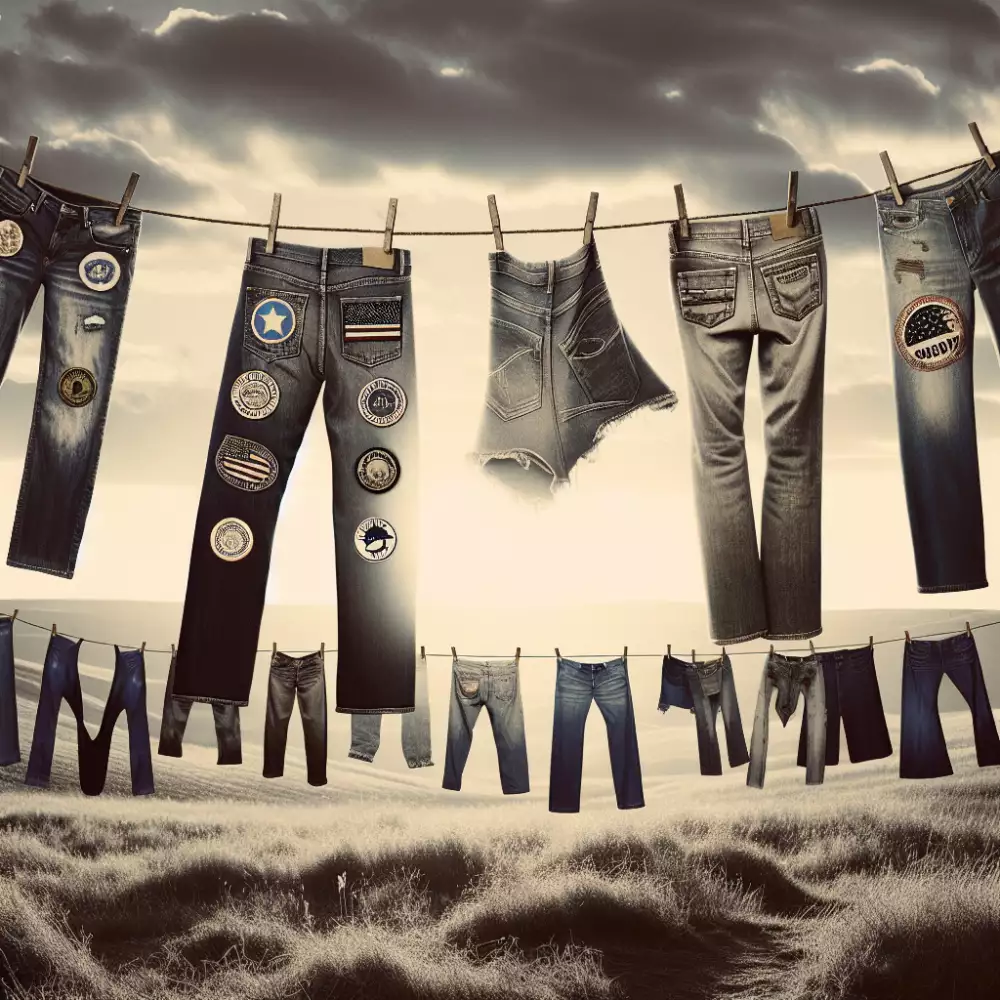
Sometimes, specific brands become associated with certain political ideologies. For example, in the US, some brands are seen as more "conservative" while others are considered "liberal." This association often comes from the brand's advertising, public statements, or even who is seen wearing them.
Beyond brands, the way we wear jeans can also make a statement. Ripped jeans might be seen as rebellious, while tailored jeans could project an image of authority. During elections, you might even see people wearing jeans adorned with political buttons or patches.
Ultimately, "politics jeans" is less about a particular label and more about how this wardrobe staple reflects and shapes our political landscape.
Celebrities and Politicians Rocking the Look
The marriage of fashion and politics has always been a hot topic, and nothing exemplifies this more than the humble pair of jeans. Once a symbol of rebellion and counterculture, jeans have been adopted by politicians and celebrities alike, often sending powerful messages through their sartorial choices. Think of the iconic image of Barack Obama in dad jeans – a calculated move to appear relatable to the everyday American. Or consider the numerous female politicians who have donned jeans to challenge traditional notions of power and femininity.
| Feature | Politics Jeans (Hypothetical) | Regular Jeans |
|---|---|---|
| Branding | May feature political slogans, party symbols, or candidate names | Typically features brand names, logos, and stylistic elements |
| Material | Likely denim, but could use organic or recycled materials for ethical statements | Wide range of materials from denim to corduroy to blends |
| Price | Potentially higher due to niche appeal and potential use of premium materials | Varies widely from budget-friendly to luxury brands |
While there isn't a specific brand called 'politics jeans' (though that's a fantastic idea!), the very act of politicians wearing jeans, particularly premium denim brands, sparks debate. Some criticize it as a shallow attempt to connect with younger generations, while others applaud it as a step towards dismantling outdated dress codes and embracing a more modern image.
Celebrities, ever the trendsetters, also play a significant role in shaping the political narrative around jeans. Whether it's sporting a denim jacket with a political slogan or partnering with ethical denim brands, their choices resonate with millions and can influence consumer behavior. Ultimately, the intersection of jeans, politics, and celebrity culture highlights how clothing can be a powerful tool for communication, sparking conversations and challenging norms.
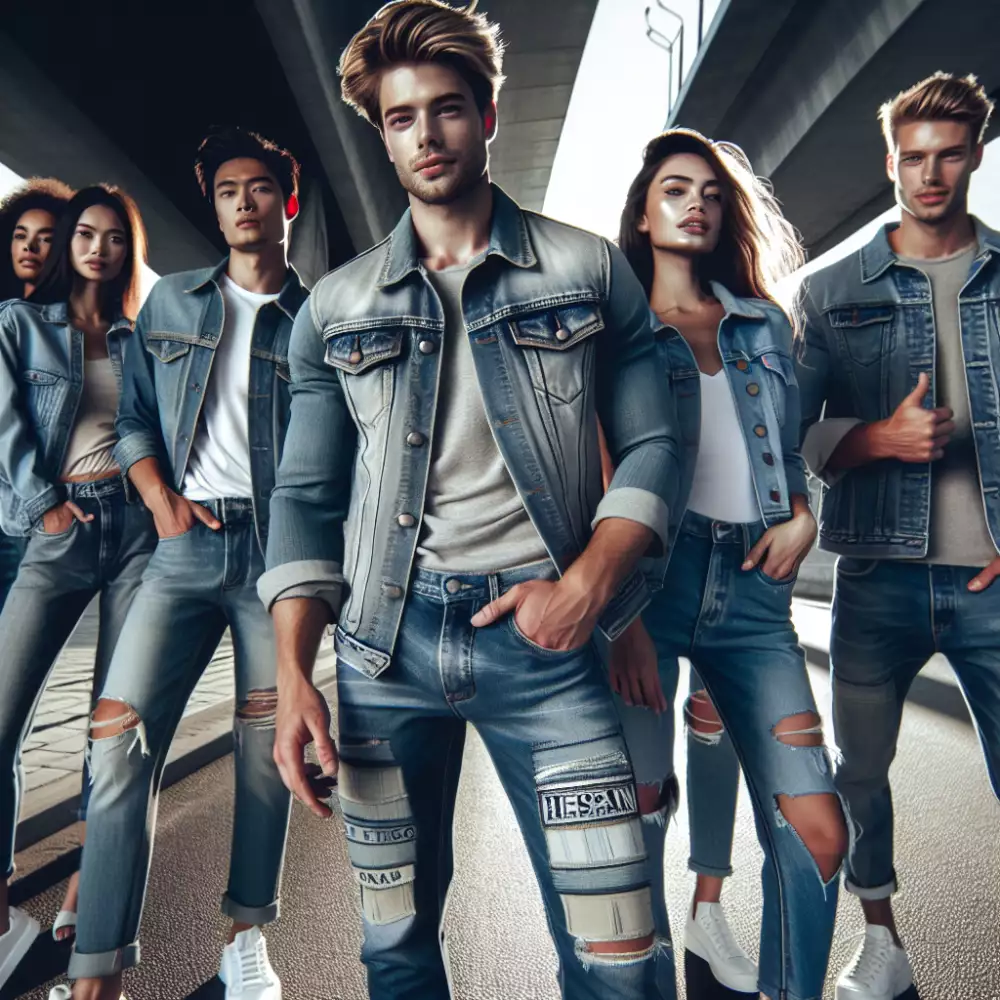
How to Style Your Politics Jeans
“Politics jeans” isn’t a recognized term or brand. However, we can explore how to style jeans to reflect your political views or for events with a political theme.
First, consider the context. A political rally calls for different attire than a fundraiser. For rallies, comfort and practicality are key. Opt for classic straight-leg or relaxed-fit jeans in durable denim. Pair them with a t-shirt representing your chosen candidate or cause. A canvas tote bag can carry essentials and campaign materials.
Fundraisers or political dinners often require a more polished look. Dark wash jeans in a slim or straight fit can be dressed up with a blazer and a button-down shirt. For women, a silk blouse or a statement necklace adds sophistication.
Accessorizing is another way to showcase your political leanings subtly. Enamel pins featuring political slogans or symbols can be worn on a denim jacket or tote bag. A scarf in the colors of your political party adds a subtle touch.
Remember, the most important thing is to feel comfortable and confident in your outfit. Let your personal style shine through while expressing your political views.
Finding Affordable and Ethical Options
Navigating the world of conscious consumerism, especially within the realm of fashion, can feel like a minefield. You want to make sure your clothes are made ethically and sustainably, but you also don't want to break the bank. This is especially true when it comes to a staple like jeans. Fear not, finding affordable and ethical denim is possible!
Start by researching brands known for their commitment to fair labor practices and eco-friendly production. Look for certifications like Fair Trade, GOTS (Global Organic Textile Standard), and OEKO-TEX, which indicate responsible sourcing and manufacturing. Don't be afraid to explore beyond big-name brands. Smaller, independent labels often prioritize ethical practices and offer unique styles.
Another great option is to give pre-loved denim a new life. Thrifting and shopping secondhand are not only budget-friendly but also incredibly sustainable. You'll find a treasure trove of unique vintage pieces and gently used jeans from various brands, all while reducing textile waste. Remember, every purchase is a vote for the kind of world you want to see. By choosing affordable and ethical options, you can rock your denim with a clear conscience and a happy wallet.
The Impact of Fashion Choices
The clothes we choose to wear can be a powerful form of self-expression, and jeans have often found themselves at the intersection of fashion and politics. Whether it's a specific brand like 'politics jeans' making a statement with its designs, or the broader ways in which people use denim to align themselves with certain ideologies, the impact of these choices is undeniable.
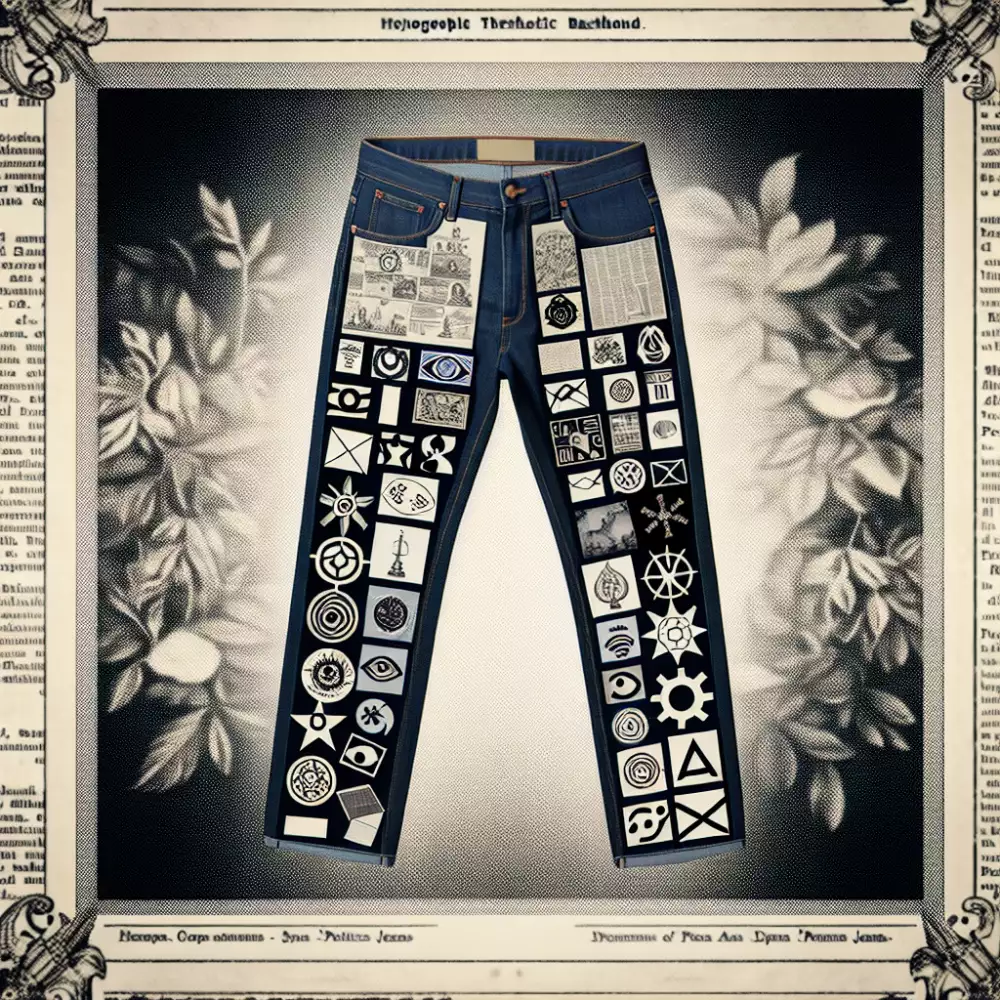
Historically, jeans have been adopted by various subcultures and political movements as a symbol of rebellion, working-class solidarity, or countercultural values. Think of the jeans-clad protesters of the 1960s or the association of denim jackets with punk rock and grunge movements. These associations, though often fluid and evolving, demonstrate how a seemingly simple garment can become imbued with political significance.
Today, the relationship between jeans and politics continues to evolve. Some brands might incorporate political slogans or imagery into their designs, while others might focus on ethical production practices or support for social causes as part of their brand identity. Consumers, in turn, may choose to support brands that align with their values or use their fashion choices to signal their own political leanings.
Ultimately, the impact of these choices extends beyond the realm of personal style. When people wear their beliefs on their sleeves – or rather, on their legs – it can spark conversations, challenge norms, and even influence broader cultural and political discourse.
Future of Politics in Fashion
The intersection of fashion and politics has never been more intertwined, and the future of this dynamic relationship is ripe with possibilities. While the term "politics jeans" might evoke images of literal slogans stitched onto denim, the reality is far more nuanced.
One potential avenue is the rise of brands aligning themselves with specific political ideologies or social causes. Imagine a denim brand, perhaps even named "Politics Jeans," that champions sustainable practices, fair labor conditions, and donates a portion of its profits to organizations promoting voter registration. This brand's jeans become more than just clothing; they become a statement of values, a way for consumers to wear their beliefs on their sleeves, or rather, their legs.
Beyond overt branding, the future of "politics jeans" could manifest in subtle design choices. Think cuts and styles inspired by historical political movements, or the use of fabrics sourced from countries with progressive social policies. Imagine denim jackets adorned with embroidered patches representing different social justice causes, allowing individuals to customize their look while sparking conversations and raising awareness.
Ultimately, the future of politics in fashion, particularly within the realm of denim, lies in its ability to empower individuals to express their values and engage in meaningful dialogue. Whether through bold statements or subtle design choices, "politics jeans" have the potential to transform a wardrobe staple into a powerful tool for change.
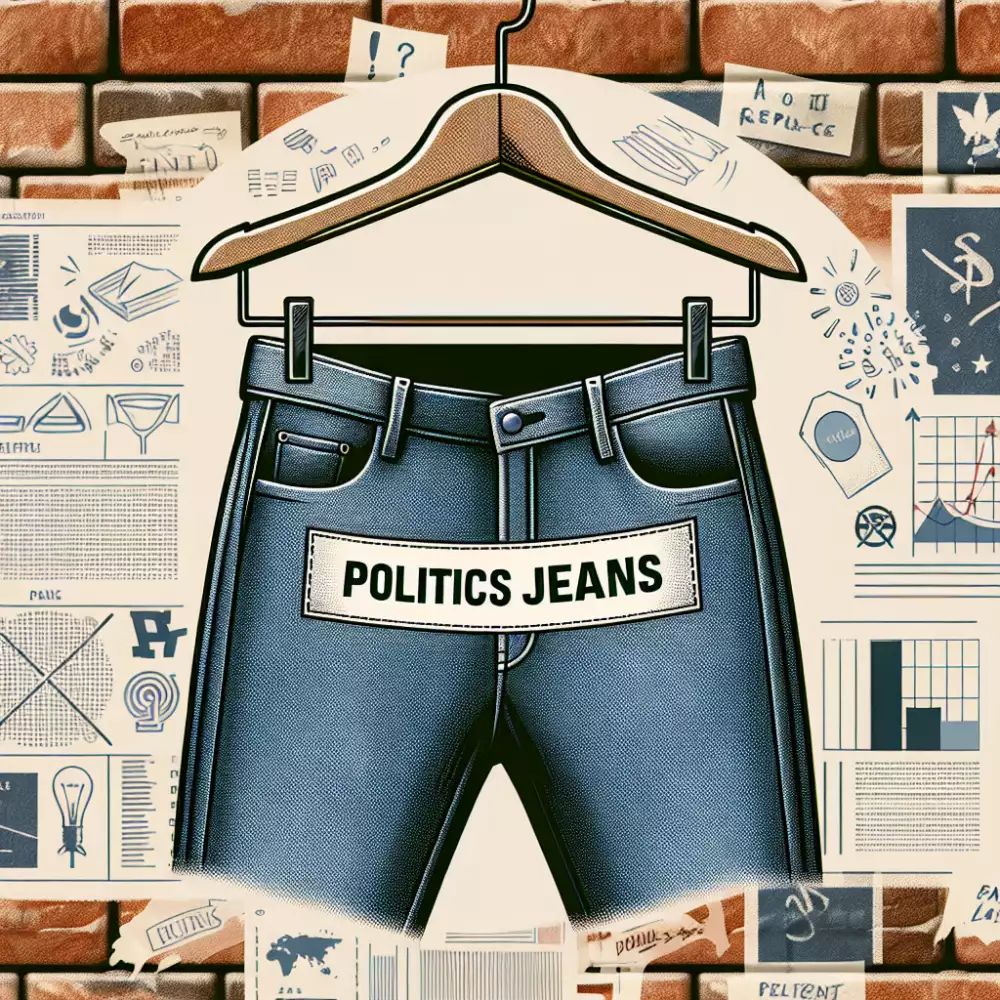
Beyond Jeans: Other Political Garments
While jeans have become a potent symbol of political expression, they are far from the only garment to carry political weight. Throughout history, clothing has been used to signify dissent, affiliation, and revolution.
The simple act of wearing white became a powerful statement for the women's suffrage movement in the early 20th century. The Pussyhat, with its distinctive pink cat ears, emerged as a symbol of protest and solidarity during the 2017 Women's March. In many cultures, traditional clothing has been reclaimed and worn as a statement of cultural pride and resistance against colonialism.
The color black has been adopted by various groups, from anarchists to anti-fascist protesters, as a symbol of resistance and rebellion. Military uniforms and camouflage patterns are often appropriated by activists and artists to critique militarism and conflict.
Even seemingly innocuous items like bandanas and armbands can become potent symbols of political movements. The act of reclaiming and reinterpreting clothing and fashion continues to be a powerful tool for political expression. Whether it's a deliberate fashion statement or the adoption of a particular garment by a movement, clothing can amplify voices and make political statements that transcend words.
Publikováno: 06. 07. 2024
Kategorie: Fashion


